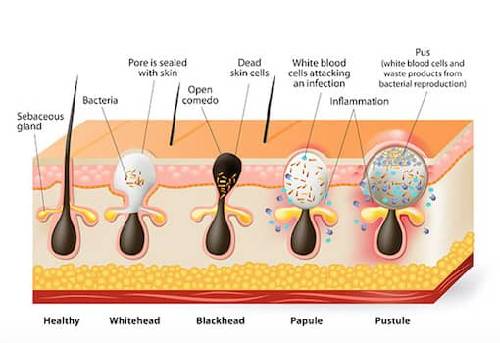
Contents
In this article we will look at:
- What is acne?
- How does acne occur?
- Who is prone to acne?
- What are the symptoms of acne?
- How is acne diagnosed?
- What are the complications of acne?
- What is the treatment for acne?
- More Topics Related to Acne Treatment
You can click on any of the links above to navigate to the section of your interest.
What is acne?
Acne is a common disease affecting more than 85 % of the teenagers and young adults. This skin condition develops when the hair follicles of the skin become clogged with oil and dead cells. The areas most affected in the body by acne are the face, neck, chest, back, shoulders, and upper arms.
The different types of acne are blackheads, whiteheads, papules, pustules, nobules and cysts.
This skin condition can be highly persistent, often crowding on various areas of the skin.
Depending on its severity, acne may leave unsightly scars on the skin, which can be emotionally distressing.
Therefore, it would be wise to consult a dermatologist early, right at the onset of this condition, before it causes significant physical and emotional scarring.
How does acne occur?

Our skin has tiny pores which connect to the oil glands beneath the skin. Small canals called follicles connect the pores to the glands. Each of these follicles have a hair growing through it. The oil glands secrete sebum, which is an oily substance. The sebum carries the dead skin cells through the follicles, up to the surface of the skin.
The follicles may get blocked when the body produces too much sebum and dead cells. This creates a perfect ground for bacteria to thrive. Once infected with bacteria, inflammation results, causing pimples to erupt on the surface of the skin.
There can be may reasons behind the increased oil production in the body and acne outbreaks on the skin, such as:
living in hot and humid climates
undergoing stress
hormonal changes during adolescence, causing androgen levels to rise, which makes oil glands grow under the skin
menstruation in women causing hormonal fluctuations
hormonal changes related to use of contraceptive pills
using oily face creams and cosmetics
hair dyes and greasy hair products
wearing rough clothing which rubs against your back and chest
- excessive sweating after exercising
Who is prone to acne?
You are at an increased risk of developing acne if you :
are a teenager as teenagers undergo hormonal changes
a woman nearing the time of your monthly menses, which is when hormone fluctuations happen
take certain medications (corticosteroids, lithium, anticonvulsants, barbiturates, androgenic steroids, DHEA, and medications that contain bromides or iodides) make you prone to developing acne
are under a lot of stress
use unclean and unhygienic makeup tools
use greasy creams and lotions
use greasy hair care products and hair dyes which can clog pores
are a pregnant women undergoing hormonal changes
are using birth control pills which can cause hormonal changes
are someone with a family history of acne
use oily lotions and creams or work in a grease-filled area
- keep picking on your existing acne, which aggravates the condition
What are the symptoms of acne?
Depending on the severity of the condition, the acne symptoms may vary from person to person. The common symptoms are:
- clogged pores (pimples, blackheads, and whiteheads)
- papules (small red, tender bumps)
- pustules (pimples or raised lesions with pus )
- cysts (nodules filled with pus or fluid)
How is acne diagnosed?
There are no special tests performed for the diagnosis of acne. Indeed, some people do not visit a doctor at all for acne treatment.
In cases of frequent acne outbursts, the doctor may ask you your medical history, and perform a simple physical examination
However, if the acne is severe and persistent your doctor, depending on the severity of your condition, may prescribe certain tests to find out, if the acne is a symptom to an underlying condition. For example, hormonal imbalance in women, such as higher than normal amounts of testosterone, could result in acne.
What are the complications of acne?
Acne scarring is one of the most common complications. It occurs when the nodules and cysts burst, rupturing the skin, and leaving behind a permanent unsightly scar. Scarring can also occur if you keep squeezing your pimples. The main types of scars are:
- Ice pick scars: these look like small but deep holes that have been punctured on the surface of the skin using a sharp object.
- Rolling scars: are formed when scar tissue develops forming bands and making the skin look uneven.
- Boxcar scars: are like depressions or craters in the skin.
What is the treatment for acne?
Depending on the severity of your condition your dermatologist may prescribe various kinds of treatments which are currently available for acne such as:
- - Chemical Peel
- Laser Skin Resurfacing (LSR)
More Topics Related to Acne Treatment
People interested in this topic also read:
Patient Experiences



Questions answered by trusted doctors



Did you know?
Very common among teens
85% of the teenagers and two-third of adults aged 18 years and older suffer from acne in India.
More common in boys
Acne is more common and severe in boys, than girls, in India.
Global surge in acne cases
Adult acne is 200% on the rise globally, due to stress, poor diets and pollution.
Related videos
Related articles
Dialysis is a procedure in which the blood is filtered mechanically without the help of the kidneys. If the kidneys are not functioning properly then Dialysis will take over the function of the failed kidneys.
Vitiligo is a state in which a person is found to develop white patches in various parts of his body. The problem may start in any part of the body skin and gradually spreads in different other portions of the body.
Rhinoplasty is known as nose job. It is a plastic surgery which helps in reconstructing and correcting the shape of the nose. Reconstructive surgery and Cosmetic surgery are the two types. Nose job helps in improving the appearance of the nose.




